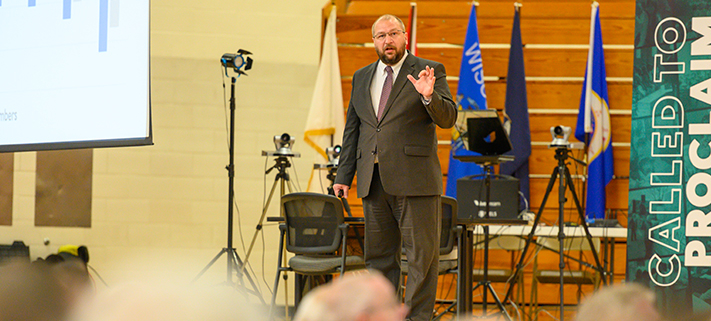Looking ahead for the generations to come
Rev. Jonathan Hein, director of the Commission on Congregational Counseling, presented his essay topic following the theme of the convention, “For the Generations to Come.” In his presentation he provided an overview of current church membership trends, not just in WELS, but in Christianity across America, as well as the social and cultural factors that contribute to these trends.
The heart of Hein’s message focused on the real motivation for the work of WELS as a church body and its individual congregations—sharing the love of Christ, as Christ commanded in Matthew 28:19,20.
In examining membership decline, Hein noted that, if trends continue, WELS could lose anywhere from 260 to 400 congregations in the next 20 years. Hein attributes this decline to a few cultural shifts in recent years, including the acceptance of religious pluralism, secular humanism defining modern morality and ethics, the erosion of the traditional family, and increasing distrust in churches as institutions. Meanwhile, 25 percent of Americans in 2019 identify as having no religious affiliation, an increase of more than 70 percent in the last decade.
“We’re facing very real and large challenges, but the way the Lord always works, he takes things that look bad and makes them good,” says Hein. “We need to seek first that we’re glorifying Christ.”
He stressed the importance of creating a Christian community through relationships and building friendships with people God puts in our lives.
Delegate Daniel Douglas, principal and teacher at Mt. Olive, Overland Park, Kan., says, “It was comforting to reinforce my approach as a principal – that it’s about the importance of relationships. When you have a relationship with people, then that can open the door for ministry.”
Rev. Jim Strand, pastor at St. Paul, Bloomer, Wis., says the idea of encouraging members to let their light shine is critical to standing out today. “If you let your light shine, then people might ask why, and then you can proclaim Jesus. That’s the best evangelism program.”
In his presentation, Hein said: “We will help our members see the face of Christ in their neighbor. We will encourage them to build authentic friendships with those currently outside the church. Hospitality will be a core value among us. We will do whatever is necessary to knit our members into something more than acquaintances. They will have a family. We will zealously, almost recklessly, pursue the straying.”
“If we are doing all we can with the gospel, the numbers do not matter,” concluded Hein. “Only the gospel can create faith, but we need to do a better job of creating an audience for the gospel.”


